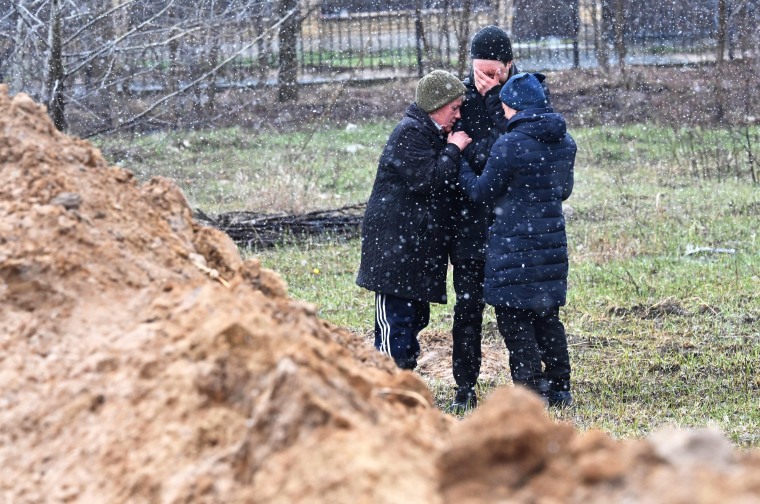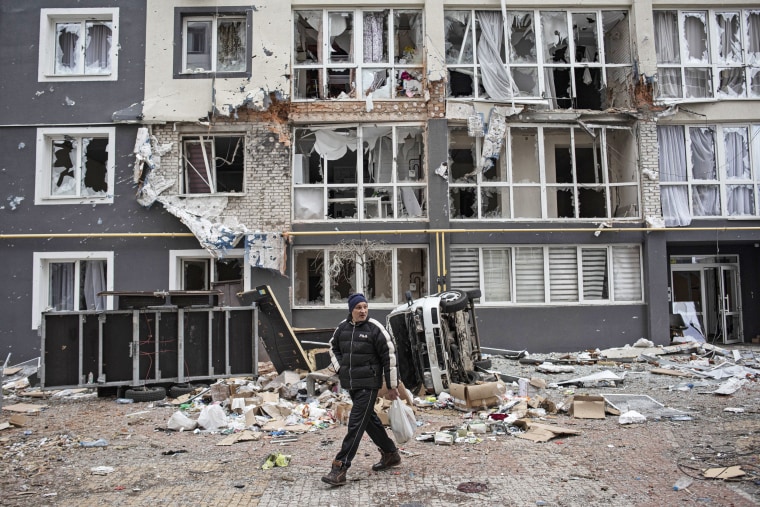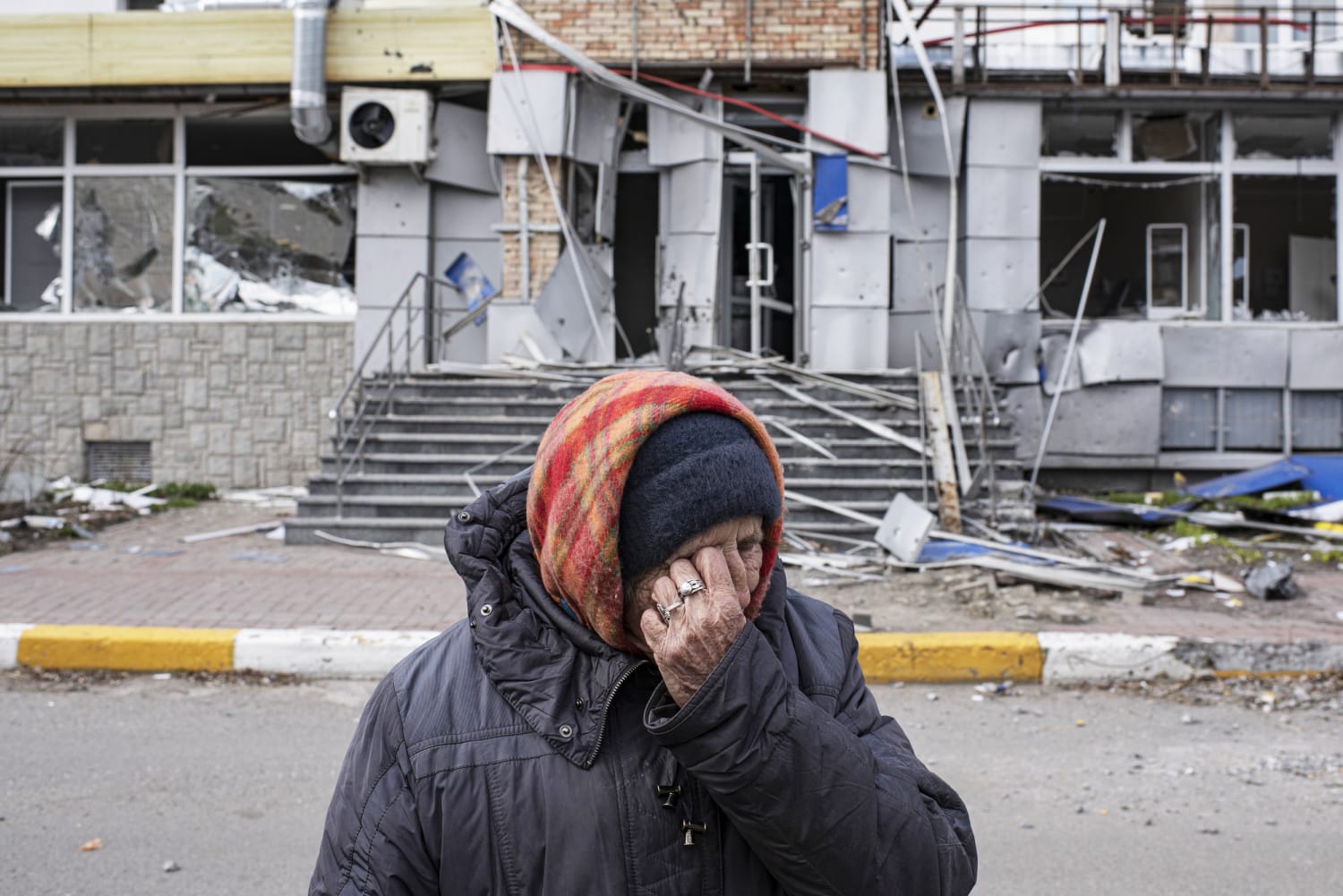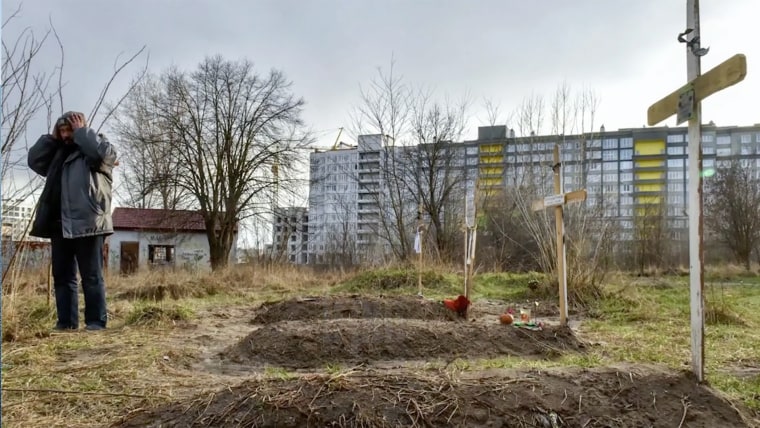From the early days of the war in Ukraine, President Volodymyr Zelenskyy has accused Russia of committing war crimes. That charge has been echoed by officials from the U.S. and its allies as the conflict has progressed.
More recently, horrifying images of bodies in civilian clothes and reports of alleged atrocities in the areas outside Kyiv have sparked renewed claims of war crimes and calls for justice from the U.S., the European Union and human rights organizations.
But what constitutes a war crime? And how can perpetrators be held accountable?
What are war crimes?
According to the 1949 Geneva Conventions, war crimes encompass a range of behaviors in armed conflict. These include the intentional targeting of civilians, torture or inhuman treatment, attacking areas that are not part of military objectives and intentionally attacking schools, hospitals and religious buildings that are not part of military objectives.
The International Criminal Court defines war crimes as “grave breaches” of these conventions, which were ratified by all United Nations member states.
Ukraine, the U.S, and its allies accuse Russian forces of targeting civilians indiscriminately, but Russia has consistently denied doing so. Ukraine has also accused Russia of genocide, listed separately from war crimes by the ICC, for its actions in Bucha, outside Kyiv.
Despite the stigma attached to being accused of war crimes, they are a familiar feature of war, experts say.
“It would be a very unusual war if there weren’t war crimes on both sides,” said William Schabas, professor of International Law at Middlesex University in London, who was also a member of the Sierra Leone Truth and Reconciliation Commission.
How are countries and people held accountable?
There are several ways that countries and individuals can be made to answer for war crimes. The ICC, established in 2002 in The Hague, Netherlands, was set up to investigate and prosecute war crimes, genocide, crimes against humanity and crimes of aggression.
Neither the U.S., Russia nor Ukraine are parties to the agreement that set up the court. However, Ukraine has given its approval for the ICC to examine alleged atrocities committed in its territory dating back to Russia’s annexation of Crimea in 2014.
In addition to the ICC, the U.N. has in the past set up special tribunals to prosecute war crimes, as it did after the Balkan conflict in the 1990s.

“I think there will be a division of labor in that Ukraine will investigate all crimes they can and they will be encouraging the ICC to look at some of the more senior players, and see if they can issue international arrest warrants against those people who may be traveling and Ukraine wouldn’t have reach to have them arrested,” said Andrew Clapham, author of “War” and professor of international law at the Geneva Graduate Institute in Switzerland.
“The most responsible and most serious crimes are going to be investigated and prosecuted at the ICC whereas Ukraine will prosecute others.”
How is evidence being gathered in Ukraine?
Ukraine is already gathering evidence of war crimes committed during the war.
Prosecutors, local law enforcement agencies, and the State Emergency Service conduct inspections after shelling and explosions, and record evidence at the scene of crimes, according to the Prosecutor General’s Office. They are also questioning witnesses together with teams from Poland and Lithuania.
The European Union has also said that it will work with Ukraine to collect evidence and investigate war crimes and crimes against humanity.

In addition to the teams collecting evidence, the Ukrainian government created a website for people to send information about the crimes they witnessed. More than 6,000 messages have already come in, according to the Prosecutor General’s Office.
Outside of efforts by the Ukrainian government, the International Criminal Court also opened an investigation into war crimes in early March, and people are able to submit their experiences on the ICC website.
Who can be prosecuted?
Investigations into war crimes can focus on soldiers, commanders and heads of state.
Ukraine’s Prosecutor General’s Office has already identified more than 200 members of Russia’s military and political leadership who they suspect of war crimes or other wrongdoing. Some have already been detained, though the prosecutor’s office didn’t specify how many.
“If you’re going to charge people up the chain of command — not the guy who’s arrested on the battlefield as a prisoner of war, but a colonel, who was in charge in Mariupol or something — you have to show that fellow was in charge of what was happening there and was involved in the attack,” said Stephen Rapp, who lead the Office of Global Criminal Justice in the State Department from 2009 to 2015.
What’s the timeline for arrests and prosecutions?
Gathering evidence, getting indictments against individuals and eventually prosecuting them is a lengthy and complicated process that won’t likely happen any time soon in international courts.
“It’s a long-term game in terms of international criminal prosecutions,” said Joseph Powderly, associate professor of public international law at Grotius Centre for International Legal Studies, Leiden University. “They are almost always post facto. It’s something that needs to be documented, collected and stored so that there is the possibility in the future to prosecute perpetrators.”
War crimes carry no statute of limitations, meaning that people can be prosecuted anytime.
“One could see trials in decades to come,” Clapham said. “The speed isn’t really the point. The point is identifying people who are the criminals and them realizing that accountability will come one day and there will be a chance for the full truth to be told.”
Who has been prosecuted for war crimes in the past?
The ICC has successfully convicted eight people, all for crimes committed in Africa.
Those convicted include Thomas Lubanga Dylio, who was arrested in 2006 and found guilty in March 2012 of enlisting and conscripting children under the age of 15 for armed conflict in Congo. He was sentenced to 14 years in prison and released in 2020. Ahmad Al Faqi Al Mahdi was found guilty in September 2016 of intentionally directing attacks against religious and historic buildings in Timbuktu, Mali, in 2012. He was sentenced to nine years in prison, which was later reduced by two years and is set to be released in September.
The ICC isn’t the only international court to deal with war crimes. The U.N. established its own court of law to deal with war crimes committed during the conflicts in the Balkans in the 1990s. Its mandate lasted from 1993 to 2017, and 91 people were sentenced in the court, including Ratko Mladić, who was convicted of some of the worst atrocities of the war, including the slaughter of 8,000 Muslims in Srebrenica. He is serving a life sentence.
After World War II, 18 leading Nazis were convicted of war crimes and crimes against humanity at the International Military Tribunal in Nuremburg, Germany.
Source: | This article originally belongs to Nbcnews.com











